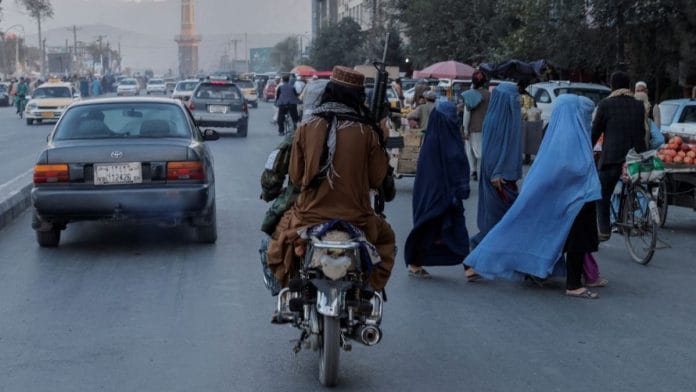The Taliban have cited the public flogging of Muslim men in Gujarat in defence of their security guards beating up Afghan female students in Badakhshan University Monday, ostensibly because the girls were not wearing “proper uniform.”
In a WhatsApp conversation with me, Abdul Qahar Balkhi, the spokesperson of the ministry of foreign affairs of the Islamic Emirate, responded to the question on guards beating the female students by sending two video clips – one of the French police tackling a couple of female protesters and another of the Gujarat police flogging 10 Muslim men. “Would you rather have us deal with civil disobedience like this?” Balkhi asked.
The men who were tied to a pole in Gujarat’s Undhela village and publicly flogged by policemen as villagers cheered on were accused of disrupting a Garba event the previous night.
I asked Balkhi if he justified the beating up of Afghan female students because Muslim men were being flogged in India. He replied, “The reference was not only to India, but the link before it was to French conduct with protests.
“All these actions are wrong, but journalists should keep everything in context by not allowing their raw emotions and prejudice to dictate their reporting,” Balkhi added.
Certainly, there is some irony in the Islamic Emirate invoking the actions of the police in the world’s largest democracy. Afghanistan’s current rule of law is synonymous with a puritanical version of the Sharia and its government still hasn’t been formally recognised by the international community 15 months after the Taliban took power, although India has opened a mission in Kabul.
The Gujarat government has still not censured the plainclothes policemen for taking the law into their own hands; a petition filed by the victims came up in the Gujarat High Court a fortnight ago and the court asked the government to respond by December.
Perhaps, Balkhi is right. All these actions are wrong. Moreover, there must be some context applied in reporting every story, both in India and in Afghanistan.
Also read: ‘Sin under Islam,’ Taliban bans women students from taking videos, photos on university campus
Seeking context in oppression
The Taliban’s foreign office spokesperson is pointing out that back in Badakhshan, the women were beaten up because they “failed to adhere to uniforms and were denied entry, which led to these women protesting (denial of entry and going home) as instructed by the security guard.”
According to Balkhi, the women then “started causing civil disobedience which provoked the guard to lash out, which in itself is wrong and will be dealt with in accordance with the law.”
What Balkhi is saying is clear: The Taliban are in power. The Taliban have made it clear that all women appearing in public must wear either the full black burqa which covers the full female body or the niqab (the face veil). If you think you can get away by wearing a black head scarf and a black face mask that reveals the eyes and the forehead and the cheeks and the chin – well, you can’t.
According to the English website of the Afghan-language ‘Hasht-e-Subh’ daily, “The Taliban have increased the pressure on female students at Badakhshan University for some time now. The officials of the Ministry for the Propagation of Virtue and the Prevention of Vice department for the Badakhshan province have made it mandatory for female students to wear a burqa, and do not allow girls who do not wear a burqa to enter the university.
“These double pressures of the Taliban have fed up the female students of this province. They protested against the imposition of strict restrictions by the Taliban’s authority in front of the entrance gate of the university. The pleas of these students have been severely suppressed by the Taliban, and some of these girls (were) beaten up severely.”
Also read: Afghanistan is facing severe crisis under Taliban. It gets worse with its ‘women situation’
The difference in similarity
As for Balkhi, by citing the French police’s rough tackling of female protesters and the flogging of Muslim men in Gujarat, he is perhaps pointing to the double standards that prevail in the international community regarding Afghanistan, France and India.
Balkhi wants to know why the French and the Indians are not being censured by the rest of the world for doing much the same that the Taliban are doing.
But like he says himself, Balkhi needs to see the context. Not only is France a Security Council veto-wielding power, it also has some of the strongest defence of fundamental rights and freedoms on its statute books, while India’s Constitution guarantees equal rights for all.
Certainly, the moral of the story here is that in the digital world, you can’t hide your flaws for too long – especially as they emerge at someone else’s expense. The Gujarat flogging, for example, has made waves in the Islamic Emirate of Afghanistan, even if the Emirate is drawing the wrong conclusions from the attack on Muslims.
The author is a consulting editor. She tweets @jomalhotra. Views are personal.
(Edited by Prashant)






